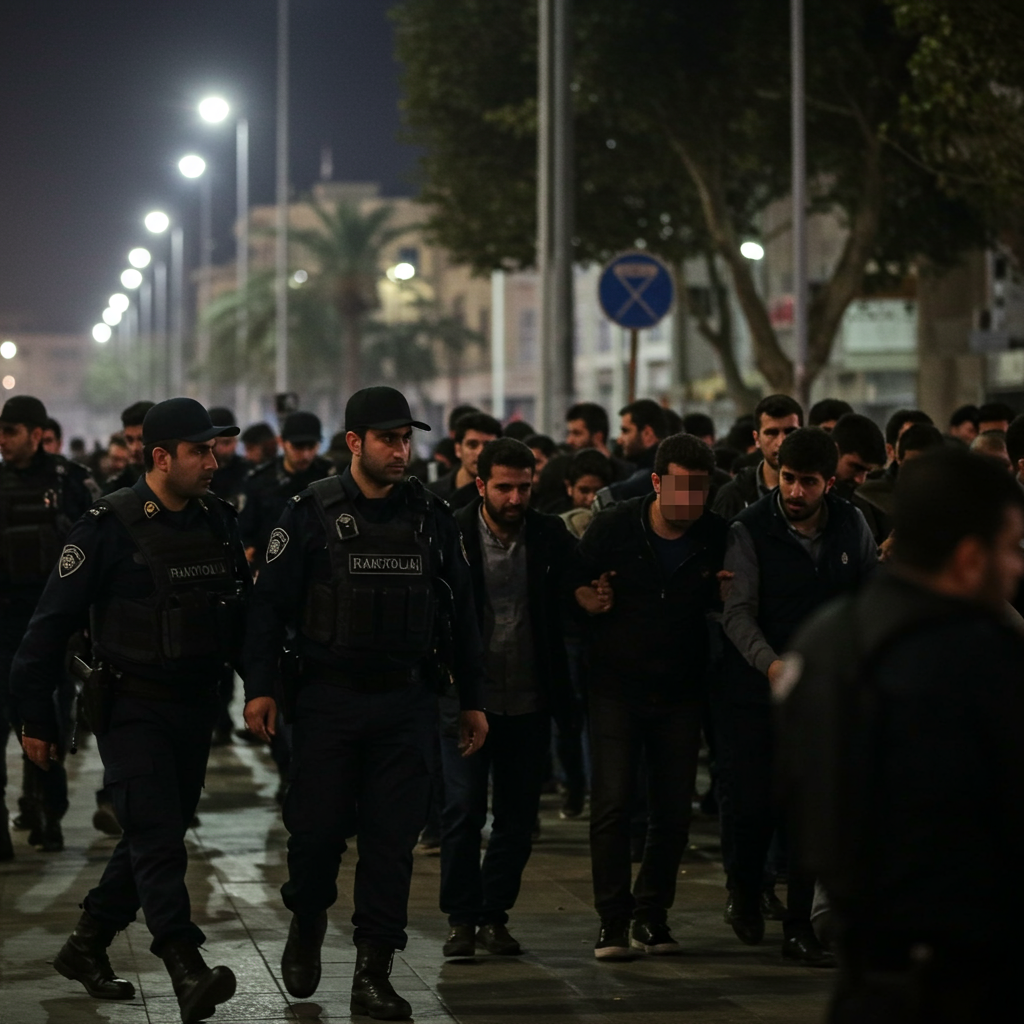In the aftermath of recent intense hostilities with Israel, Iranian authorities have reportedly unleashed a sweeping campaign of internal repression. This effort includes widespread arrests and the execution of individuals accused of having ties to Israeli intelligence agencies. While officials frame these actions as crucial steps for national security, human rights groups and critics voice grave fears that the crackdown is primarily a means to stifle dissent and consolidate power over the population.
The Official Justification: Countering Alleged Israeli Infiltration
Iran’s government asserts that its security services faced an “unprecedented infiltration” by Israeli operatives. Officials claim that intelligence provided by these alleged agents played a direct role in the targeted killings of senior Iranian figures during the conflict. These casualties reportedly included high-ranking commanders from the elite Islamic Revolutionary Guard Corps (IRGC) and prominent nuclear scientists. Tehran specifically attributes these assassinations to agents of Israel’s Mossad intelligence agency operating within the country’s borders.
The Ministry of Intelligence has publicly declared that it is engaged in a “relentless battle” against perceived “Western and Israeli intelligence networks.” This includes explicitly naming agencies like the CIA, Mossad, and MI6. According to Fars News Agency, a media outlet affiliated with the IRGC, the “Israeli spy network” significantly increased its activity inside Iran following the start of Israel’s recent actions on June 13.
Reported Scale of Arrests and Executions
Iranian authorities have announced the detention of hundreds of suspects across the country. Fars News Agency specifically reported that Iranian intelligence and security forces arrested “more than 700 individuals linked to this network” over the 12-day period of the conflict. State television has aired what are presented as confessions from some detainees. These individuals purportedly admitted to collaborating with Israeli intelligence.
The crackdown has also involved executions. During the 12-day conflict, three people were executed on charges of spying for Israel. Disturbingly, three more individuals faced execution on similar charges just one day after the ceasefire was declared. Authorities stated the executed individuals were allegedly attempting to smuggle assassination equipment into Iran. These executions underscore the severity of the government’s response.
Critics’ Concerns: Silencing Dissent and Tightening Control
Despite the government’s framing of the crackdown as a national security imperative, a different perspective is offered by human rights groups and activists. They express profound concern that the operations are being used as a pretext to suppress opposition voices. These groups argue that the true aim is to reinforce the state’s control over the population.
These concerns are amplified by Iran’s well-documented history. The regime has a long-standing practice of extracting forced confessions from detainees. Critics also point to the conducting of unfair trials that lack due legal process and safeguards. Human rights organizations fear that the current wave of arrests could lead to many more executions in the coming weeks and months.
Pressure on Media and Civil Society
The government’s actions extend beyond those directly accused of espionage. The crackdown appears to target a wider spectrum of perceived threats to the regime’s stability.
Pressure on Persian-language media outlets based abroad has notably intensified. These outlets include BBC Persian, the London-based Iran International, and Manoto TV. Iran International reported a disturbing incident where the IRGC allegedly detained the parents and brother of one of its TV presenters in Tehran. This action was reportedly taken to pressure the presenter into resigning from her job due to the channel’s coverage of the Iran-Israel conflict. The presenter allegedly received a phone call from her father, prompted by security agents, urging her to quit and warning of further consequences if she did not comply.
Journalists working for outlets like BBC Persian have reportedly faced increasingly severe threats directed at them and their families. Security officials allegedly contacted journalists’ families. They reportedly claimed justification in targeting relatives as hostages in a “wartime context.” Journalists have also reportedly been labeled “mohareb,” a term meaning ‘one who wages war against God.’ Under Iranian law, this charge can carry the death penalty. Manoto TV has reported similar incidents, including threats against employees’ families. Relatives were reportedly threatened with charges such as “enmity against God” and espionage, both capital offenses under Iranian law. Analysts view these tactics as part of a broader strategy to intimidate and silence exiled media workers who provide independent information to Iranians.
Beyond media figures, security forces have also reportedly detained dozens of activists, writers, and artists. In many cases, these detentions have occurred without formal charges being filed. Reports also indicate that arrests are targeting family members of those killed during the 2022 “Woman, Life, Freedom” anti-government protests. These actions suggest a wider campaign. It targets not only current activists but also those linked to previous waves of dissent and opposition. Specific reports highlight increased security operations in minority regions, such as Kurdish areas. Activists there claim over 500 arrests have occurred since mid-June.
Restricting Information Flow
During the conflict, the Iranian government severely restricted access to the internet. Even after the ceasefire, full access had reportedly not been restored. Limiting internet access during crises has become a common tactic used by the Iranian government. It is particularly employed during nationwide protests against the government. Most social networks like Instagram, Telegram, X, and YouTube are blocked in Iran. News websites such as BBC Persian have also long been inaccessible without using a Virtual Private Network (VPN) proxy service. Iranians have also reported receiving warning text messages from the intelligence ministry. These messages indicate that their phone numbers appeared on social media pages related to Israel. The texts instructed them to disengage or face legal action.
Historical Context and Expert Analysis
Many observers and human rights advocates have drawn stark parallels between the current situation and historical periods of intense repression in Iran. Notably, comparisons are made to the brutal suppression of political opposition during the Iran-Iraq War in the 1980s. Critics frequently reference the events of 1988. Human rights groups estimate that thousands of political prisoners were executed then. These executions often followed brief, secretive trials by so-called “death commissions.” Most victims were buried in unmarked mass graves.
Experts view the recent crackdown through this historical lens. Sanam Vakil of Chatham House describes such repression as “inevitable” and “prolonged.” This reflects the regime’s core priority on preventing dissent from gaining momentum. This strategy is deeply rooted in the post-1979 revolution era. It has been consistently maintained under Supreme Leader Ayatollah Ali Khamenei. This is especially true in response to discussions of regime change by foreign leaders or during periods of heightened external pressure.
Mahmood Amiry-Moghaddam of Iran Human Rights suggests that the Islamic Republic utilizes increased repression post-ceasefire. He argues it aims to mask potential military setbacks. It also serves to preempt future protests. Ultimately, it is about ensuring the regime’s survival. Hussein Baoumi of Amnesty International contends that Iranian authorities weaponize the death penalty. They do this through expedited trials and executions. Their goal is to assert control and cultivate fear among the population. Iran is already ranked by human rights organizations as the world’s second-most prolific executioner after China.
The current wave of arrests and executions is seen by analysts as a predictable response. It follows external conflict and internal pressure points. While the regime frames it as a necessary measure against foreign influence and separatism, rights groups and experts largely interpret it as a calculated move. It aims to suppress domestic opposition and maintain the existing power structure. This pattern of tightening security, accelerating trials, and executing accused spies or dissidents is not unprecedented for the Iranian regime following high-profile attacks or increased international tensions.
Frequently Asked Questions
What is Iran’s official reason for the wave of arrests and executions?
Iranian authorities state they are targeting individuals suspected of links to Israeli intelligence agencies. They claim this crackdown is necessary for national security following unprecedented infiltration by Israeli agents. Officials allege that intelligence provided by these agents contributed to the killings of senior military personnel and nuclear scientists during the recent conflict with Israel.
Where are these crackdowns reportedly taking place?
The government has announced widespread arrests across the country. Reports from human rights groups and activists indicate specific focus areas. These include increased security operations and arrests in minority regions, such as Kurdish areas. Pressure campaigns and threats have also targeted journalists and their families linked to Persian-language media outlets based abroad.
Why are human rights groups concerned about these actions?
Human rights organizations and critics fear the arrests and executions are a pretext to suppress internal dissent and tighten state control. They cite Iran’s documented history of obtaining forced confessions and conducting unfair, expedited trials. Concerns exist that many detainees are facing violations of due process and could be subjected to torture, leading to further executions.
Conclusion
The reported wave of arrests and executions in Iran represents a significant escalation of domestic repression in the wake of the recent conflict with Israel. While the government justifies these actions as vital for countering foreign espionage and protecting national security, a substantial body of evidence and expert analysis suggests a broader agenda. Critics argue that the crackdown is leveraging the security context to silence opposition, intimidate independent media, and reinforce state control, echoing patterns of repression seen in previous periods of internal unrest and external pressure. The scale of arrests and the swift executions raise serious concerns about human rights and the potential for further severe measures against perceived opponents of the state.



